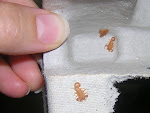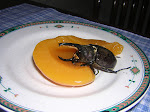
The scorpion of greatest health concern in the United States, and the one I am keeping an eye out for at home, is Centruroides sculpturatus (aka, the Bark scorpion). Bark scorpion venom is the most toxic of U.S. scorpions, though in the general scheme of things it is considered fairly mild. Bark scorpions are small, with a body length of about 2" (not including tail); sub-adults are smaller. They are the only scorpion in the U.S. that can climb walls and ceilings, and can squeeze through cracks as narrow as 1/8". Second stories and flimsy screen doors are not deterrents. Their ecological needs are so well-suited to the well-watered lawns and structures of the desert southwest, that Bark scorpions are the most often encountered scorpion in urban and rural homes throughout their range.
So of course there are a lot of myths and misconceptions surrounding them. One of the most unsubstantiated is the myth that cats are immune to scorpion venom. When last I checked, no cats were on record as having verifiably died from a scorpion sting, yet only two human deaths in the last 40 years are on record. So much for that. So prevalent is the myth that cats are immune that one established entomologist in the southwest wasn't willing to weigh in either way (!). Fortunately for me, my own observation provided all the proof I need to definitively say:
at least some cats are not immune to scorpion stings.
Last year, my cat spied a scorpion on the deck and received at least two (perhaps three) good hits before I broke up the encounter. (Pulled her off like a street fighter begging for more, really.) Her symptoms included:
- immediate swelling to twice the normal paw size (the presumed stinging site);
- pain that last for several hours;
- lack of eating or drinking during two normal meal periods.
I half suspect the venom-immune myth for cats comes from exaggerating the following (seemingly standard) observations: 1) scorpion venom does not seem to affect cats to the same degree that it does a human of the same physical size (i.e., an infant); 2) the sight of a scorpion brings out unusual aggression in cats to kill it, in spite of repeated stings (giving the false impression that the cat is unaffected).
As these desert days heat up into the 80's (and any day now, beyond that), I'm keeping an eye out for the start of scorpion activity. Even for an entomologist, they're an unwelcome -- albeit exciting! -- house guest.
+reduced.jpg)


No comments:
Post a Comment